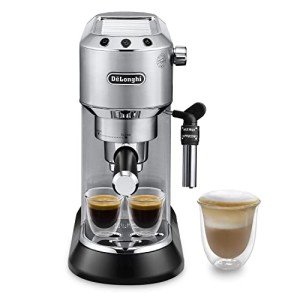20 Things You Must Know About Commercial Espresso Machines
The Rise of Home Espresso Machines: A Comprehensive Guide
As coffee fans continue to look for fresh and tasty brews at home, the appeal of home espresso machines has risen recently. Pump Espresso Machines of coffee shops and coffeehouse, these machines empower individuals to craft barista-quality espresso beverages from the convenience of their kitchen areas. This article will check out the different types of home espresso machines, their functions, and factors to consider for selecting the ideal one. Additionally, it will supply a choice of FAQs to help potential purchasers make informed decisions.
Types of Home Espresso Machines
Home espresso machines can be categorized into numerous categories based upon their systems and user-friendliness. Each type has its special features, pros, and cons.
Type
Description
Pros
Cons
Manual Espresso Machines
Requires the user to by hand manage the developing procedure, involving methods like pulling a lever to produce pressure.
- Complete control over brewing process
- Compact design
- Requires skill and practice
- Time-consuming
Semi-Automatic Machines
Machine automates water flow and pressure, however the user still manages the dosing and period of the developing procedure.
- Balance of automation and control
- Versatile
- Learning curve for perfecting strategies
Completely Automatic Machines
Automates the entire developing procedure, from grinding to developing, frequently with programmable settings for tailored beverages.
- Extremely easy to use
- Quick and practical
- Less control over the developing process
- Higher price point
Capsule or Pod Machines
Utilizes pre-packaged espresso capsules or pods to produce coffee quickly and easily.
- Extremely easy to use
- Minimal cleanup
- Limited flavor range
- More pricey per cup than ground coffee
Super-Automatic Machines
Combines features of fully automatic machines with integrated grinders, enabling users to brew entire bean espresso and milk-based drinks with one touch.
- All-in-one convenience
- Ideal for milk-based beverages
- Often the most expensive
- Can be bulky
Features to Consider
When selecting a home espresso machine, possible buyers need to think about the following functions to guarantee they select a machine that meets their needs:
Grinder Type:
- Built-in grinders can provide fresher premises however might need more upkeep.
- Different mills permit more customization of grind size.
Pressure:
- Look for machines that produce at least nine bars of pressure, which is ideal for developing espresso.
Water Temperature Control:
- Machines with adjustable temperature level settings permit better extraction of taste from beans.
Milk Frothing Options:
- Consider whether you desire a manual steam wand for frothing or an automatic milk frother for benefit.
Alleviate of Cleaning:
- Machines with removable parts and self-cleaning functions substantially decrease clean-up time.
Size and Design:
- Ensure the machine fits comfortably in your kitchen and lines up with your aesthetic choices.
Budget:
- Set a budget before beginning your search, as prices can vary substantially from affordable designs to high-end machines.
Advantages of Home Espresso Machines
Owning a home espresso machine provides various advantages:
- Cost-Effective: Over time, brewing espresso at home can save coffee lovers cash compared to frequent coffee shop check outs.
- Modification: Users can experiment with different beans, grind sizes, and brewing methods to discover their best cup.
- Convenience: The capability to brew espresso whenever eliminates the requirement to head out to a coffee shop, specifically useful throughout late nights or mornings.
- Quality Control: With a home machine, individuals have total control over the quality of ingredients and developing procedures.
Drawbacks of Home Espresso Machines
However, there are some disadvantages to consider:
- Initial Investment: High-quality espresso machines can be expensive, needing a significant upfront investment.
- Learning Curve: Mastering the art of espresso developing can take some time and practice, which might be daunting for newbies.
- Maintenance: Like any appliance, espresso machines require routine cleansing and maintenance to guarantee ideal performance.
FAQs
1. What is the best kind of home espresso machine for novices?
Answer: For novices, a semi-automatic machine is often suggested as it provides a balance in between control and automation, enabling you to find out the essentials without overwhelming complexity.
2. How much should I invest in a home espresso machine?
Response: Entry-level machines can start around ₤ 100 to ₤ 300, while higher-end models can vary from ₤ 500 to over ₤ 2000. It's vital to set a budget based on your expected usage and preferred functions.
3. Do I require a different grinder?
Response: While some espresso machines feature built-in mills, investing in a separate grinder permits greater personalization and makes sure much better quality grounds.
4. How often should Visit Web Page clean my espresso machine?
Response: Cleaning frequency can differ by machine type, however it's usually advised to clean up the machine after each use and carry out deep cleanings weekly or monthly, depending on usage.
5. Can I make milk-based beverages with any espresso machine?
Response: Not all machines feature milk frothing capabilities. If you enjoy beverages like lattes or coffees, look for a machine with a steam wand or automatic frother.
Home espresso machines are transforming the way coffee fanatics enjoy their beloved brews. With different types and advanced features readily available in the market, there is something for everyone. Whether it's the pleasure of creating unique recipes or merely appreciating the best shot of espresso, buying a home espresso machine can improve both the coffee-drinking experience and the quality of life for coffee fans all over. As with any investment, it is vital to weigh the advantages against the potential drawbacks and select a machine that effortlessly fits both your way of life and choices.
